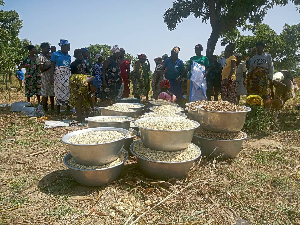 EUGAP has brought tremendous improvement in the entire agricultural value chain in Upper West Region
EUGAP has brought tremendous improvement in the entire agricultural value chain in Upper West Region
The European Union-Ghana Agricultural Program which has been under implementation from 2017 and expected to end in 2025 has brought tremendous improvement along the entire agricultural value chain in all the eleven districts and municipalities of the Upper West region.
The project is injecting €147 million support to fourteen (14) districts in the Northern part of Ghana has all the eleven (11) districts and municipalities of the Upper West region covered.
The project is being implemented by GIZ, World Bank and French Development Agency.
During EUGAP's media engagement and field visit, the Upper West regional director of Agriculture, Huudu Abu, who's also the EUGAP/PCU coordinator stated that the program is divided into three components which include, production investment program, market oriented agricultural program and resilience against climate change.
On her part, Fadila Ahmed Tijani, the North-West monitoring and evaluation expert, extolled the significant improvements that have been witnessed since the inception of the program.
"It will further interest you to know that we work with all the actors within the value chain," she indicated.
She further said that as a result of the impact of the project, the Wa West district has become an exporter of organic groundnuts:
"Wa West district is the first producer of organic groundnuts to Switzerland."
She added that this project is essential in improving production as well as their incomes.
During the media engagement at the Regional conference hall of the department of agriculture, a beneficiary of the program underscored the significance of the program on their activities.
Naah Patrick, a member of Sungmaale cashew group in the Dafiama-Busie-Issa district stated that the program has enlightened them on climate change and its challenges.
"GIZ EU-GAP has been teaching us on climate change and the best agronomic practices which would weaken the adverse effects of climate change. They have taught us not to burn the trash after harvesting and how to also construct fire belts for our farms," he stated.
He went ahead to speak about the planting of trees especially cash crops on their farms.
Naah Patrick further highlighted that one essential aspect has been the Village Savings and Loans (VSLA) which encourages savings thus culminating in financial empowerment of farmers.
During the field trip to Duong a community in the Nadowli/Kaleo district of the Upper West region, Madam Henry Martha, said one thing that their community is saddled with is their inability to do dry season gardening due to lack of irrigation facilities.
"We are also confronted with challenges with regards to access to fertilizer. Notwithstanding the cost of fertilizer, sometimes even with the money on hand, we are often unable to readily get access to them to buy," she stressed.
In Lawra, the team visited Apex Peanuts processing center which is into the processing of groundnuts into groundnut paste and oil.
The CEO of the company, Boro Bayi Emmanuel, indicated that GIZ was instrumental in building his capacity on how to secure funding and also how to run his company effectively. He however said the challenges they are confronted with include intermittent supply of electricity and the inability to get enough raw materials from the local market.
The EU-GAP is expected to end next year 2025, with so many successes to show including the construction of numerous feeder roads across various districts of the Upper West region.